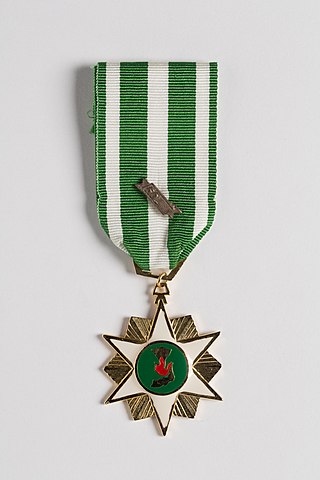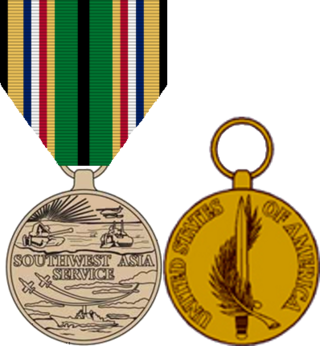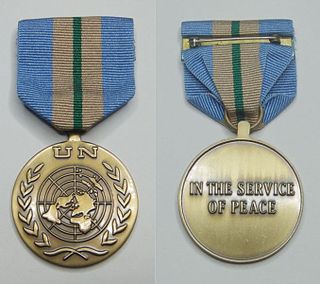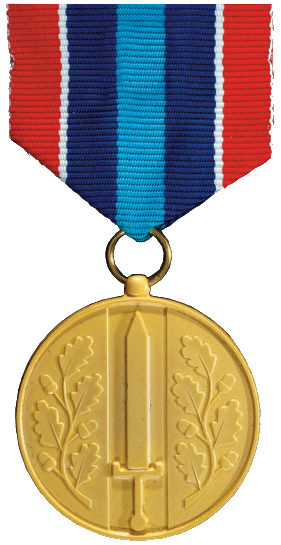
The Defense Meritorious Service Medal (DMSM) is an award bestowed upon members of the United States military by the United States Department of Defense. In the order of precedence of the United States Armed Forces, it is worn between the Purple Heart and the Meritorious Service Medal. The medal is awarded in the name of the Secretary of Defense to members of the Armed Forces who, while serving in a joint activity, distinguish themselves by meritorious service, but not of a degree to warrant award of the Defense Superior Service Medal.

The Republic of Vietnam Campaign Medal, also known as the Vietnam Campaign Medal, is a South Vietnamese military campaign medal which was created in 1949, and awarded to French military personnel during the First Indochina War. During the Vietnam War, the South Vietnamese government awarded the Republic of Vietnam Campaign Medal with Device to members of the South Vietnamese military for wartime service and on March 24, 1966, to members of the U.S. military for support of operations in Vietnam. In May 1966, other allied foreign military personnel became eligible for the award.

The Iraq Campaign Medal (ICM) was a military award of the United States Armed Forces which was created by Executive Order 13363 of U.S. President George W. Bush on 29 November 2004, and became available for general distribution in June 2005. The medal was designed by the U.S. Army Institute of Heraldry and was awarded during the Iraq War, from 19 March 2003 to 31 December 2011.

The Southwest Asia Service Medal was a military award of the United States Armed Forces which was created by order of President George H.W. Bush on March 12, 1991. The award is intended to recognize those military service members who performed duty as part of the Persian Gulf War and for a time thereafter. The medal was designed by Nadine Russell of the Army's Institute of Heraldry. The colors of the ribbon are tan, representing sand, with the black, white, red, blue, and green colors symbolizing the colors of coalition countries' national flags.
The Kosovo Campaign Medal (KCM) was a military award of the United States Armed Forces established by Executive Order 13154 of President Bill Clinton on May 3, 2000. The medal recognizes military service performed in Kosovo from March 24, 1999 through December 31, 2013.
The Armed Forces Service Medal (AFSM) is a military award of the United States military that was created on January 11, 1996, by President Bill Clinton under Executive Order 12985. The AFSM is a deployed service medal that is presented to those service members who engage in "significant activity" for which no other U.S. campaign or service medal is authorized.

The United Nations Service Medal Korea (UNSMK) is an international military decoration established by the United Nations on December 12, 1950 as the United Nations Service Medal. The decoration was the first international award ever created by the United Nations and recognized the multi-national defense forces which participated in the Korean War.

A United Nations Medal is an international decoration awarded by the United Nations (UN) to the various world countries members for participation in joint international military and police operations such as peacekeeping, humanitarian efforts, and disaster relief. The medal is ranked in militaries and police forces as a service medal. The United Nations awarded its first medal during the Korean War (1950–1953). Since 1955, many additional United Nations medals have been created and awarded for participation in various United Nations missions and actions around the world.
The NATO Medal is an international military decoration which is awarded to various militaries of the world under the authority of the North Atlantic Treaty Organization (NATO). It is manufactured by Eekelers-Centini Intl, of Hemiksem, Belgium.

The Kuwait Liberation Medal is a medal created in 1994 that was issued by the government of Kuwait to both local and foreign military personnel who served in the Gulf War's "Liberation of Kuwait" campaign phase of 1990 and 31 August 1993.

The Naut Tahrir al-Kuwait was instituted by King Fahd ibn Abdulaziz of Saudi Arabia for service during the Liberation of Kuwait campaign.

This is a list of Norwegian orders and medals, in order of precedence. This list contains all medals approved for wearing on a Norwegian military uniform in ranked order.

The Iraq Medal was authorised on 23 February 2004. It was a campaign medal issued to members of the British Armed Forces and certain attached personnel, who served between 20 January 2003 and 22 May 2011 on, or in support of, Operation Telic - the designation for British operations during the 2003 Invasion of Iraq and its aftermath.

The Operational Service Medal for the Democratic Republic of the Congo is a British armed forces campaign medal, awarded mostly to military personnel who served between 14 June and 10 September 2003 on Operation Coral.
The General Service Medal is a service medal of Canada established by Queen Elizabeth II in March 2004 and presented for the first time on 29 November 2004. It is awarded to members of the Canadian Forces, or members of allied forces, for deployment outside of Canada with Canadian Forces, though not necessarily in a theater of operations, to provide direct support, on a full-time basis, to operations in the presence of an armed enemy.

The Western European Union Mission Service Medal, is an international military decoration awarded to individuals, who served with Western European Union (WEU) military missions.

The Defence Service Medal with Laurel Branch is a military medal of Norway. Established on 1 May 1982, the medal is awarded for outstanding or noteworthy service to the Norwegian Armed Forces. It may be awarded to Norwegians and foreigners who are civilians or military personnel.

The Medal for Defence Service Abroad is a military medal of Norway. Established 1 January 1993, the medal was originally a participant medal awarded for service during military operations that took place in the 1990s. The subsequent establishment of the Medal for Defence Operations Abroad rendered this medal obsolete. However, in 2009 the medal was reintroduced as an achievement medal. The medal was awarded for distinguished bravery and courage, beyond what is normally required during combat operations. The medal's color was changed from bronze to gold, and the ribbons of the medal would vary, depending on the area of operations. During this period of award the medal was always awarded with a rosette. Finally, in 2012 the medal was further changed to a single ribbon design for all awards. The medal may be awarded with rosette for particularly meritorious distinction.

The Ebola Medal for Service in West Africa, known simply as the Ebola Medal, is a service medal for issue to the Armed Forces and to civilians, working either for Her Majesty's Government or for non-governmental organisations, in support of the British Government's response to the Ebola crisis in West Africa between March 2014 and March 2016. The medal is the first to be awarded by the UK Government for a humanitarian crisis response.

The Operational Service Medal Iraq and Syria or Operation Shader Medal is a British armed forces campaign medal, awarded mostly to military personnel who served in the operational area of, or in support of Operation Shader. The medal was first announced by then Defence Secretary, Sir Michael Fallon on 19 September 2017. It was first awarded, to service personnel, on 18 July 2018 in London by Defence Secretary Gavin Williamson. This Operational Service Medal is the first medal of the contemporary era to be awarded to individuals who served outside of the operational area, reflecting the changing nature of warfare.















